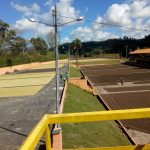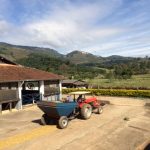87.8
History of the farm
The 19th Century was coming to an end. Brazil was bubbling politically. The country was already beckoning a change from monarchy to republic. Slavery was losing power, however it still survived due to the large production of Brazilian agriculture. It is in this scenario that the Campos family kept strong roots in the countryside of Minas Gerais, more precisely in the hamlet of São Francisco de Paula. Brazilian coffees, especially from Minas Gerais, were emerging as high-penetration products in foreign markets. Mário Campos e Silva became a coffee producer of great strength in the hamlet in 1904.
Mário Campos e his wife, Maria José Cambraia de Campos, affectionately called “voinha” (little grandmother) by her grandchildren, had a son, Francisco Cambraia de Campos. Not unlike his father, Francisco also went to work on the farm, learning from a young age the field crafts, such as administering family business and caring for the coffee fields.
On May 20, 1946, grandson Eduardo Pinheiro Campos was born. The boy was the great pride of his father, Francisco, and his mother, Maria Conceição Pinheiro de Campos. He grew up, following the example of his father, on the farm, accustomed to rural life. His adolescent years encouraged him to spread his wings. He studied civil engineering and became one of the major professionals in the sector in the Brazilian southeast. Some time later, he founded a new company, Emccamp Residencial.
Still young, Eduardo Campos received a parental inheritance, a good piece of land in Presidente Olegário, a city in Minas Gerais 430 kilometers from the capital, Belo Horizonte. The farm was christened “Dona Neném,” in homage to his mother.
A short time after discovering himself as an engineer, Eduardo Campos rediscovered himself as an agro-businessman. Coffee permanently returned to the hands of the man from Minas Gerais. “I started working with coffee production in the Cerrado region in 1977. In other parts of the Cerrado there was already coffee production, although in a timid way,” boasts Campos.
The environment is priority number one. Because of this, Campos replanted a good part of the native vegetation of the region, making up for some of the environmental impact. It is not just the trees that recompose the scenery, the waters are also part of the natural protection. Eduardo Campos recovers Permanent Preservation Areas (APPs). The APPs (as they are commonly referred to in Brazil) are limits drawn between the edges of streams, lakes or rivers and the start of crops. This distance maintains the high quality of the waters and guarantees the future of watersheds.
The strict environmental laws followed to the letter, added to good agricultural production practices, management, and attention to society guarantee the three farms important international certification seals. Boa Sorte, Dona Neném and São João Grande are certified by UTZ Certified and Rainforest Alliance. In addition to extra concern for the environment, the crops receive totally monitored anti-pest treatment. The patios, rest boxes, depots and all the other sectors of the farm are duly sanitized, without any risk of contaminating the beans. The workers are well received and receive all benefits prescribed by Brazilian labor law.
Another important step for maintaining the certifications is the harvest period. Campos explains how he is able to perform a selective harvest, seeking high quality of the berries. “My harvest is done by machines that perform a selective harvest. The choice is make by the degree of maturation of the beans, which is differentiated by the weight and density of each seed. We regulate the machine to pick only the so-called “cherry,” leaving the green coffee to ripen on the tree. Days later, we return and pick those beans that stayed in the coffee fields, that were green and are now ripe, at the ideal point to harvest. After this second pass, some beans still remain, and these are picked by hand, which we call the manual re-pass. This entire process is to obtain a quality crop.”
Another point of attention is the renovation of the coffee fields. The coffee trees are renewed to guarantee the strength of the berries. There are greenhouses with seedlings grown for replacement, substituting old plants. “We have a renovation program, and each year I renew 10% of my crops. The Cerrado is a region that has many variations, it is a place with higher average temperatures that other regions like, for example, the South of Minas Gerais, and because of this some farmers, like us, have for 10 to 12 years chosen to renew the crops,” Campos relates. After about a decade, the yield of the tree starts to decline and renovation guarantees a younger harvest with more beans and higher-quality berries.
All of the work with redoubled caution is rewarded. Eduardo Campos’ production has repeatedly figured in prominent positions in competitions that prize the best coffees of the country, winning several coffee quality competitions, such as Illycafè, Rainforest Alliance, Minas Gerais State, Cerrado Mineiro region, as well as placing 20th (Pulped Naturals) in Cup of Excellence Brazil in 2013.
Note that one cannot achieve good production overnight. The coffee crops provide secular sustenance for the family. It is a tradition coupled with innovation, which enriches local production and the strength of Brazilian coffee. “It is a pleasure to work with coffee. First, because it is a family tradition. Only on my part, I have been in coffee for more than 40 years. My father, 70, and my grandfather who produced for a long time…We can say that coffee has been part of the family for 100 years. That’s more than a century of tradition in coffee farming, and always innovating,” Campos calculates.
Coffee processing system
The farm uses quality mapping before the harvest to help find the plot with the greatest potential in the harvest. This lot is a Yellow Bourbon, which was picked by hand; only completely ripe cherries were harvested. After being harvested, the coffee was taken to the post-harvest processing center. After being washed, it proceeded to the farm’s bio-reactor installation, built in 2017, in partnership with UFLA and Professor Flávio Borém, to process specialty coffees. It was developed to obtain excellent quality, that is, the perfect cup.
The lot remained in the stainless-steel reactors for 24 hours. Then it was removed and taken to African beds for 14 days of drying. Drying was finished after d days with the volcano system when the coffee reached 11% humidity. Then the coffee rested in husk for 35 days.
Certifications
Rainforest Alliance – valid until 22/04/2021
UTZ Certified – valid until 03/05/2020
Certifica Minas – valid until 20/03/2020
| Rank | 18 |
|---|---|
| Farm Name | Fazenda Dona Neném |
| Farmer/Rep. | Eduardo Pinheiro Campos |
| Altitude | 1080 m.a.s.l. |
| Country | Brazil |
| Year | 2019 |
| Size (30kg boxes) | 12 |
| City | Presidente Olegário, MG |
| Region | Cerrado Mineiro |
| Program | Brazil 2019 |
| Coffee Characteristics | winey, rum, cranberry, mango, cherry,cocoa, cinnamon, blueberry, black tea |
| Aroma/Flavor | winey, complex, bright and citric, refined |
| Acidity | buttery, round finish, clean, creamy |
| Processing system | Natural |
| Variety | Yellow Bourbon |
| Coffee Growing Area | 430 ha |
| Farm Size | 166 ha |
| Auction Lot Size (lbs.) | 793.68 |
| Auction Lot Size (kg) | 360 |
| Business Phone Number | +55 34 99831-1097 / 99946-1097 |
| Business Address | [email protected] |











